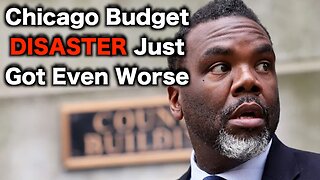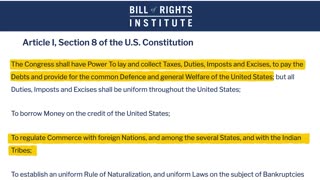Premium Only Content

Marco Rubio Reaffirms the U.S. Commitment to Foreign Aid
Senator Marco Rubio, one of the most influential Republican leaders on foreign policy issues, made strong statements regarding the direction of U.S. international aid during a recent event in Washington, D.C. Rubio emphasized the need to transform the way the country distributes resources abroad, stressing that efficiency and accountability must take precedence over bureaucracy and wasteful spending.
A New Strategy for Foreign Aid
According to Rubio, part of the historical problem with U.S. international assistance has been the reliance on non-governmental organizations (NGOs) that, despite having multimillion-dollar budgets, did not deliver resources directly to beneficiaries. “We are not going to fund an NGO industrial complex that built itself, took a substantial percentage of the money, and did not deliver it directly to the beneficiaries,” the senator stated, highlighting the need to restructure these programs to maximize the impact of every dollar spent.
The Republican legislator emphasized that the new strategy includes transferring dysfunctional programs to the State Department and implementing direct agreements with recipient countries. “We will empower our embassies and ambassadors to direct which projects we fund and how much money the countries will receive,” Rubio explained, noting that this approach will allow foreign aid to be more effectively integrated with U.S. diplomatic policy.
Rubio also highlighted the creation of specific initiatives, such as a new international health program that, according to him, will be “much more successful and effective” than previous models, ensuring that resources reach those who need them most directly.
Clarity in the Face of Criticism
The senator addressed criticism regarding alleged cuts in foreign aid, which some detractors claimed led to deaths in crisis-stricken countries. Rubio was emphatic: “No one has died because of aid cuts. The reason assistance doesn’t reach some places is not because the United States cut funds; it’s because there are ongoing wars or because the aid is stolen by criminal groups.”
As an example, he cited the situation in Sudan, where armed conflict prevents humanitarian aid from reaching the people who need it. “The aid is stolen and obstructed, used as a tool of war. That is why, in some places, the aid simply cannot be distributed,” he explained.
Rubio also mentioned the complex reality in Haiti, where criminal gangs control large parts of the country and intercept international aid. “Even if you send all the aid in the world, it is stolen. They are responsible for what happens there, not us, who provide more aid than anyone else,” he stressed.
An Unprecedented Commitment
Despite criticism, Rubio assured that the Republican administration will maintain the United States as a global leader in foreign aid: “We will provide more foreign aid than any country in the world; we will do more than anyone else. This year we will do it the right way, comprehensively, and as part of an integrated foreign policy.”
The senator emphasized that this approach not only improves aid efficiency but also protects the reputation and influence of the United States worldwide. “We are not going to continue doing things the old way. We will provide aid—we are already providing aid—but in a responsible and strategic manner,” Rubio stressed.
The Responsibility of Local Governments
Rubio insisted that, while the U.S. plays a fundamental role in international assistance, it cannot be held responsible for all tragedies occurring in conflict zones. “First of all, people did not die because England did not give enough money, or Canada did not give more, or China did; the responsibility lies with those who control these places and block or divert aid,” he stated.
In this regard, Rubio defended the Republican policy of focusing resources on programs that are controllable and directly supervised by the U.S. administration, preventing intermediaries or inefficient structures from distorting humanitarian assistance.
Conclusion: Efficiency, Transparency, and Leadership
Marco Rubio’s intervention reflects the Republican vision of pragmatic foreign policy, based on tangible results and direct oversight. In response to questions about aid cuts and their impact, the senator was categorical: the priority is to ensure that every dollar sent abroad fulfills its purpose and that local actors assume their responsibilities.
Rubio concluded by emphasizing that the new strategy not only strengthens the United States’ international presence but also protects the integrity of humanitarian programs: “All of this will be in the future. No one has died because of aid cuts. We will make a difference effectively and responsibly, as has always been the policy of our nation.”
With these measures, Republican leadership aims to consolidate the United States as the world’s leading provider of foreign aid, ensuring that assistance is effective, comprehensive, and directly beneficial to those who need it most.
-
 1:17:19
1:17:19
LIVE WITH CHRIS'WORLD
13 hours agoTHE WAKE UP CALL - 11/13/2025 - Episode 5
12.3K4 -
 2:05:11
2:05:11
BEK TV
1 day agoTrent Loos in the Morning - 11/13/2025
14.3K -
 14:34
14:34
Lady Decade
19 hours ago $1.09 earnedSolving The Mystery of the Illegal Star Trek Console - Gaming History Secrets
12.8K8 -
 LIVE
LIVE
The Bubba Army
23 hours agoWHAT's NEW IN THE EPSTEIN FILES? - Bubba the Love Sponge® Show | 11/13/25
1,268 watching -
 30:24
30:24
ZeeeMedia
15 hours agoTrump Exonerated in New Epstein Drop? Intel Assets Infiltrating Media | Daily Pulse Ep 142
20K14 -
 2:10:48
2:10:48
The Robert Scott Bell Show
22 hours agoDr. Andrew Wakefield, Vax Truth Vindication, Del Bigtree, An Inconvenient Study, Jeffrey Tucker, Health Freedom Hoax Exposed - The RSB Show 11-12-25
37.8K7 -
 17:22
17:22
Actual Justice Warrior
1 day agoDemocrats TURN ON Chicago Mayor
21.2K21 -
 14:16
14:16
Nate The Lawyer
1 day ago $4.49 earnedSupreme Court Could Force Trump to Repay All Tariffs | Lawyer Explains
24.5K21 -
 46:25
46:25
Coin Stories with Natalie Brunell
1 day agoErin West: Romance-Crypto Scam Taking Over - "Pig Butchering" Cyber Fraud Explained
19.7K1 -
 1:14:05
1:14:05
DeVory Darkins
20 hours agoDemocrats get BAD EPSTEIN NEWS after major mistake
216K188